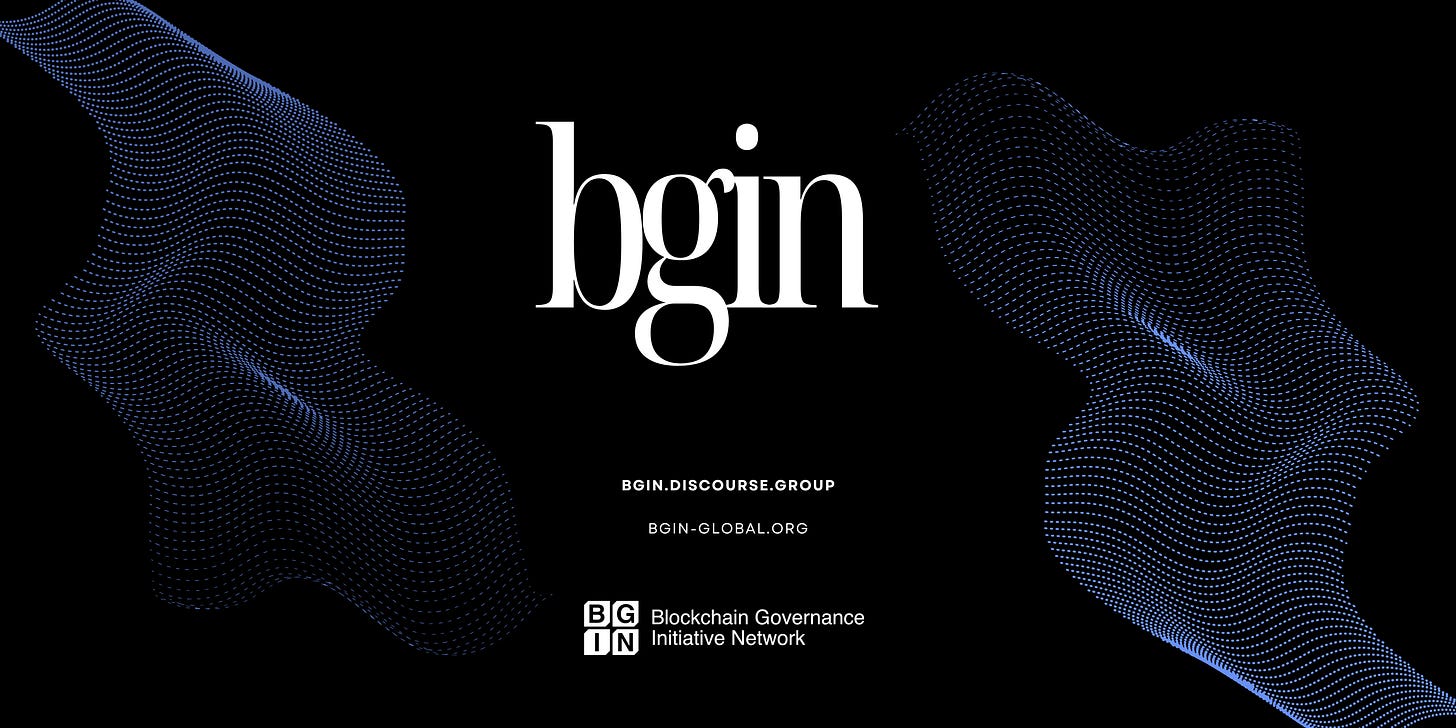The Transformative Power of Tokenisation
BGIN Block 10 Insights
In Tokyo, 2024, the Blockchain Governance Initiative Network had its 10th meeting.
These insights are condensed to share as a sync with the greater community.
Join the forum conversation by the bgin.discourse.group.
Our working groups meet online, every two weeks, and discuss the most pressing subjects relating to;
Identity Key Management and Privacy (IKP) Working Group
Financial Applications & Social Economics (FASE) Working Group.
In the swiftly evolving landscape of digital finance, the concept of tokenisation has emerged as a groundbreaking innovation, promising to redefine the mechanisms of investing, asset management, and transaction processing. This transformative approach, bridging the realms of traditional finance and blockchain technology, was the focal point of a recent discussion that sheds light on the multifaceted implications of tokenising real-world assets. Through an exploration of technical frameworks, legal considerations, and practical applications, the session illuminated the path towards a more efficient and transparent financial ecosystem.
The Tokenisation Framework: A Paradigm Shift
At its core, tokenisation involves the digital representation of real-world assets on a blockchain, offering a novel framework that transcends traditional financial boundaries. The dialogue commenced with a clear distinction between two pivotal concepts: narrowly defined security tokens and tokenised securities. This differentiation is crucial, as it lays the groundwork for understanding the transition from conventional security management, dominated by investors, transfer agents, and custodial banks, to a more streamlined and accessible model.
Embarking on the Tokenisation Journey
The discourse navigated through the phases of tokenisation, marking a significant departure from traditional practices. The initial phase introduces a permissioned blockchain to replace shareholder registers, a move towards decentralisation while maintaining a level of control and privacy. The subsequent phase contemplates the adoption of permissionless blockchains, known for their high tamper resistance. However, this shift raises pivotal debates around compliance, particularly concerning anti-money laundering (AML) and Know Your Customer (KYC) regulations, underscoring the balancing act between innovation and regulatory adherence.
Navigating Technical and Compliance Terrain
The technical underpinnings of tokenisation, such as the use of smart contracts for compliance and the potential for decentralised whitelist management, present both opportunities and challenges. The application of Zero-Knowledge Proofs (ZKPs) emerges as a compelling solution for reconciling the need for privacy with the imperative of transparent settlement processes. These discussions reveal the intricate balancing act between leveraging blockchain’s potential and adhering to established regulatory frameworks.
From Theory to Practice: A Case Study
A notable highlight of the session was the practical application presented by Societe Generale Forge in collaboration with MakerDAO. This case study exemplifies the tangible implementation of tokenisation, underpinned by a legal framework accommodating decentralised communities through innovative use of French law. The mechanics of the transaction, involving various parties and legal structures, illustrate the pragmatic challenges and solutions encountered in translating tokenisation concepts into real-world applications.
The Efficiency and Transparency Promise
Tokenisation stands to revolutionise financial transparency and efficiency. By enabling real-time asset tracking and valuation, particularly for traditionally less liquid assets, tokenisation opens new vistas for investor participation and market valuation. The discussion underscored the transformative potential of reducing information asymmetry, thereby enhancing market dynamics and asset liquidity.
Exploring the Technical and Legal Landscape
Delving deeper, the technical and legal intricacies of Societe Generale Forge's experiment with MakerDAO were examined. The CAS framework for security token issuance on a permissionless blockchain, coupled with the specific legal structures employed under French law, provided a detailed insight into the operationalisation of tokenisation in a regulated context. The delineation of roles and mechanisms for collateral and liquidation events underscored the complex interplay between technology and law in the tokenisation ecosystem.
Blockchain in Banking: A Reality Check
A candid discussion on the integration of blockchain projects within mainstream banking operations highlighted the gap between public announcements and practical implementation. Regulatory hurdles, risk management concerns, and institutional inertia were identified as significant barriers. Yet, the mention of initiatives like Project Guardian offers a glimmer of hope for a more progressive blockchain adoption in the banking sector.
Banks and Blockchain: Beyond the Hype
The conversation also distinguished between the hype surrounding blockchain announcements and the concrete application of blockchain technology in restricted, interbank contexts. Societe Generale Forge's direct engagement with DeFi protocols, as opposed to the more common approach of forking or cloning these technologies for private use, represents a bold step towards genuine innovation in financial services.
The Broader Implications and the Road Ahead
As the session drew to a close, reflections on the broader applicability of blockchain in finance, the critical role of legal frameworks and the overall impact of transparency and efficiency gains were at the forefront. The unique aspects of Societe Generale Forge's experiment with MakerDAO were highlighted as a beacon for future endeavours in blockchain and finance.
Tokenisation, as discussed, represents not merely a technological advancement but a fundamental shift towards a more inclusive, transparent, and efficient financial ecosystem. The journey from traditional securities management to a blockchain-enabled future is fraught with challenges, yet the potential rewards promise to redefine the fabric of financial transactions and asset management. As we stand on the brink of this financial revolution, the insights and experiences shared in this session offer a valuable compass for navigating the uncharted waters of tokenisation



